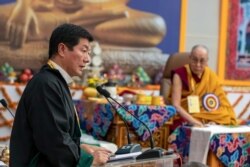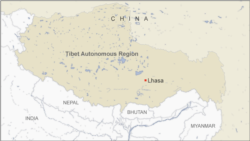The U.S. Congress on Monday passed a bill that is expected to upgrade U.S. support for Tibetans in key areas, including sanctioning Chinese officials if they try to appoint the next Dalai Lama.
The Tibetan Policy and Support Act (TPSA) was passed by the House and Senate as an amendment to the $1.4 trillion government-spending bill and the $900 billion coronavirus relief package.
It will pave the way for the U.S. government to issue economic and visa sanctions against any Chinese officials who interfere with the succession of the Dalai Lama, and will require China to allow Washington to establish a consulate in Lhasa — the capital of the Tibet Autonomous Region – before Beijing can open any more consulates in the U.S.
The bill, backed by both Democrats and Republicans, is expected to be signed into law by President Donald Trump.
Lobsang Sangay, president of the Central Tibetan Administration (CTA), the Tibetan government in exile, called passage of the bill “a momentous landmark for the Tibetan people.”
“Any interference by Chinese government officials will be met with serious sanctions and be deemed inadmissible into the United States,” he told VOA’s Tibetan Service.
“By passing the TPSA, Congress has sent its message loud and clear that Tibet remains a priority for the United States and that it will continue its steadfast support for His Holiness the Dalai Lama and the CTA,” said Sangay, who is at the helm for his second consecutive term.
Rights group International Campaign for Tibet (ICT) said the bipartisan TPSA will launch a new era in U.S. policy on Tibet.
“By passing the TPSA, Congress has not only upgraded its overall support for Tibet, but specifically laid a marker down on the global stage declaring that the international community will not accept China’s interference in the Dalai Lama’s succession and will oppose China’s human rights abuses in Tibet for as long as they continue,” ICT said in a statement.
Built on the landmark Tibetan Policy Act of 2002, the TPSA addresses Tibetan human rights, environmental rights, religious freedoms and the democratic Tibetan government in exile. It also calls for a regional framework to water-security issues, following years of concerns from environmental activists and neighboring countries that ambitious Chinese hydropower projects are diverting water, threatening regional ecosystems.
Chinese Foreign Ministry spokesman Wang Wenbin said Tuesday that China strongly opposed the bill. In the daily briefing, Wang claimed that issues involving Tibet, Taiwan and Hong Kong “concern China's sovereignty and territorial integrity,” and urged the U.S. to “stop meddling in Beijing’s internal affairs.”
The legislation also touches on the controversy around the succession of the Dalai Lama, the Tibetan spiritual leader who is also a global Buddhist authority. The Dalai Lama is expected to reincarnate after he dies, and there is widespread belief that the Chinese government will interfere in the process and appoint its own Dalai Lama for political purposes.
The TPSA says that naming the next Dalai Lama should be left solely to the Tibetan Buddhist community and that the official position of the U.S. is that China cannot interfere in the selection.
China regards the exiled Dalai Lama as a separatist and criticizes foreign officials who meet with him. The Dalai Lama has spoken occasionally about his plans for reincarnation. In 2011, he told an audience he would decide when he is about 90 years old whether he should be reincarnated. He is currently 85.







